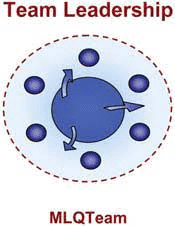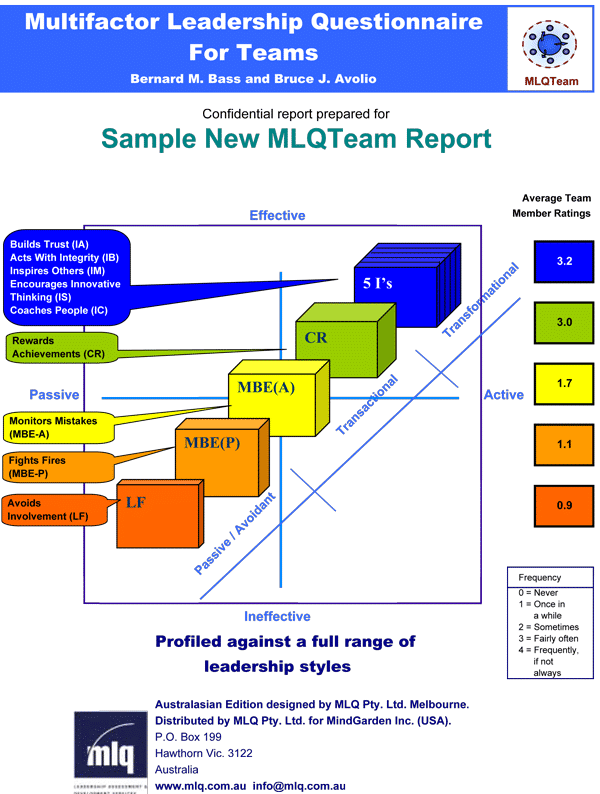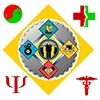
The Team Multi-factor Leadership Questionnaire (TMLQ) Assessment
tmlq
 Because teams are everywhere, it’s easy to underestimate the systemic requirements and “heavy lifting “that is necessary to yield the skills, behaviors, and results of teams “as advertised”. So many of our workplaces have significant team involvements; from what may seem like a “little thing” such as “team lifting”, right through to integrated teams requirements in electrical engineering fit outs etc.
Because teams are everywhere, it’s easy to underestimate the systemic requirements and “heavy lifting “that is necessary to yield the skills, behaviors, and results of teams “as advertised”. So many of our workplaces have significant team involvements; from what may seem like a “little thing” such as “team lifting”, right through to integrated teams requirements in electrical engineering fit outs etc.
Why is it then that you become disappointed that the team slipped a schedule, missed a quality gate (deliverable/goal), or that the electrician neglected to tell the fitter that the system was “live”. It’s tempting to blame the team members, but the real problem is often far removed from the team.
Transformational Safety has identified the “teams interface” as amongst the most significant potential factors in safety performance breakdown. In aligning this observation with the body of research surrounding transformational leadership, Transformational Safety provides a transformational focus to an MLQ-T implementation.
Unlocking Your Leadership Potential with the Team Multifactor Leadership Questionnaire (TMLQ)
In today’s complex and ever-evolving work environment, effective leadership consistently stands as a cornerstone for success. The ability to inspire, motivate, and guide teams toward a common goal is pivotal to that success. To understand and cultivate these leadership qualities, tools like the Team Multifactor Leadership Questionnaire (TMLQ) have emerged as invaluable resources for organizations seeking to enhance their transformational leadership capabilities.
The Team Multifactor Leadership Questionnaire, developed by Bruce J. Avolio and Bernard M. Bass, is designed to assess leadership behaviors and styles within a team or organizational context. Based on Bass and Avolio’s Multifactor Leadership Model (MLQ), the TMLQ evaluates various dimensions of leadership that contribute to team effectiveness and performance.
The TMLQ encompasses several key components:
- Transformational Leadership: This dimension explores leaders’ abilities to inspire and motivate their teams beyond the status quo. Transformational leaders exhibit visionary thinking, empower their team members, foster innovation, and encourage personal growth. They inspire commitment by creating a compelling vision and motivating others to achieve excellence.
- Transactional Leadership: This facet focuses on the day-to-day interactions between leaders and team members. Transactional leaders set clear expectations, provide rewards based on performance, and manage by exception, intervening when deviations occur from established standards. They maintain stability and ensure tasks are accomplished efficiently.
- Passive-Avoidant Leadership: This dimension evaluates leadership behaviors characterized by inaction or avoidance of responsibility. Passive-avoidant leaders may neglect their leadership duties, fail to address issues, or avoid making decisions, leading to a lack of direction and clarity within the team.
The TMLQ utilizes a series of questions to assess these leadership dimensions, providing a comprehensive understanding of the leadership styles and behaviors present within a team or organization. By gathering insights from team members’ perspectives, it offers a holistic view of the leadership dynamics and its impact on team performance.
Understanding the Value of TMLQ:
- Enhancing Leadership Development: The TMLQ serves as a valuable tool for identifying leadership strengths and areas for improvement. Leaders can leverage this information to tailor development programs, coaching, and training initiatives to enhance their leadership effectiveness.
- Team Performance Improvement: By understanding the leadership styles prevalent within a team, organizations can optimize team dynamics and workflow. Identifying transformational leaders who inspire and motivate others can contribute significantly to team morale, innovation, and overall performance.
- Facilitating Organizational Change: Organizations undergoing transitions or changes in leadership can utilize the TMLQ to assess the impact of new leadership styles. This information can guide the implementation of strategies to align leadership approaches with organizational goals, fostering smoother transitions and greater adaptability.
In conclusion, the Team Multifactor Leadership Questionnaire (TMLQ) is a valuable instrument for assessing leadership within teams and organizations. It enables a comprehensive evaluation of leadership styles, fostering growth, and development while contributing to improved team performance and organizational success. As leadership continues to evolve in complexity, tools like the TMLQ stand as integral resources in shaping effective leaders and high-performing teams.
The Multifactor Leadership Questionnaire for Teams (MLQT) is a short but comprehensive survey of 50 items that measures a full range of leadership styles as these are expressed in a team’s actions. This instrument complements the Multifactor Leadership Questionnaire (MLQ) used in 360degree feedback for individual leaders.

The MLQT is often a good place to start with a work group since it provides valuable feedback to the whole team about how its members see the group performing leadership functions. The MLQT provides a “snapshot” at a micro level of the extent to which a team sees itself to be supporting and practicing the Full Range Leadership Model.
If you would like to see what Wikipedia has to say about the TMLQ just click here.
Transformational Safety facilitators are all internationally qualified to deliver the Multifactor Leadership Questionnaire for Teams.
If you wish to view some sample pages from the Team MLQ provided by Transformational Safety click here.
To arrange a Team MLQ, contact [email protected].
“Failure to appreciate the power of team performance is evidence of absolute leadership failure. There is an immense difference between a group of people and a ‘team’. The ‘group’ never wins. A great ‘team’ – that should always be the aspiration. Great Leaders inspire Great Teams.”


